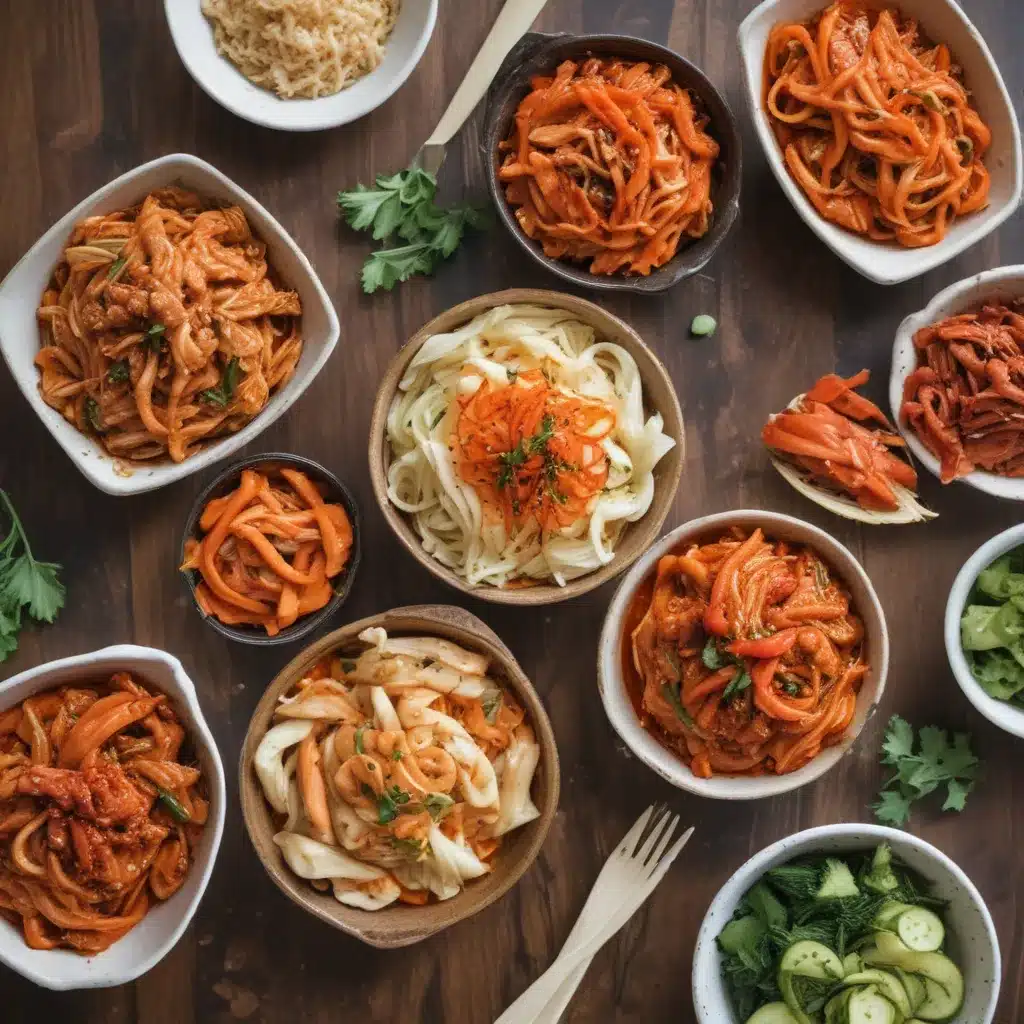
The Kimchi Conquest
Ah, the glorious world of kimchi – that spicy, fermented cabbage delight that has taken the culinary scene by storm. As a proud Boston resident, I’ve found myself on a quest to uncover the secrets of crafting the perfect homemade kimchi. It’s been a delicious journey, filled with trial and error, but the rewards are oh so worth it.
You see, kimchi is more than just a side dish in Korean cuisine – it’s a way of life. It’s the foundation upon which many beloved Korean dishes are built, from the savory bulgogi to the sizzling kimchi fried rice. And let me tell you, there’s nothing quite like the sense of pride and accomplishment that comes from whipping up a batch of homemade kimchi in your own kitchen.
The Boston Kimchi Awakening
My kimchi journey began a few years back when I stumbled upon a quaint Korean market in the heart of Boston’s Chinatown. The moment I stepped through the doors, I was enveloped in a symphony of aromas – the pungent garlic, the earthy ginger, the fiery red chili peppers. It was as if the very air was infused with the essence of kimchi.
I’ll never forget the first time I tried a sample of the homemade kimchi they had on display. The explosion of flavors on my tongue was nothing short of revelatory. It was simultaneously sour, spicy, and umami-packed, with a satisfying crunch that belied the complex fermentation process behind it.
From that moment on, I knew I had to learn the art of making this incredible condiment myself. I scoured the internet, pored over recipes, and even reached out to local Korean grandmothers (the true masters of this craft) for their time-honored secrets.
The Kimchi Laboratory
It didn’t take long for my kitchen to transform into a veritable kimchi laboratory. I experimented with different cabbage varieties, played with spice blends, and tweaked the fermentation timeline until I found the perfect formula.
One of the key lessons I learned early on was the importance of patience. Kimchi, like a fine wine, requires time and care to reach its full potential. The initial prep work may be a bit labor-intensive, but the rewards of that long, slow fermentation process are simply unparalleled.
As one seasoned kimchi maker advised me, “The longer you let it ferment, the more complex and delicious it will become. Just be sure to keep an eye on it and adjust the flavors to your liking.”
The Boston Kimchi Connoisseur
These days, I consider myself a bona fide Boston kimchi connoisseur. I’ve perfected my recipe, mastered the art of fermentation, and even started experimenting with creative flavor combinations.
And let me tell you, there’s nothing quite like the feeling of serving up a plate of homemade kimchi to your friends and family, watching their eyes light up with delight as they take that first crunchy, spicy bite.
| Homemade Kimchi | Store-Bought Kimchi |
|---|---|
| Complex, nuanced flavors | Often one-dimensional |
| Customizable to your taste preferences | Limited flavor options |
| Satisfying crunch and texture | Can be softer or mushier |
| Fermented for maximum flavor development | May not be fermented as long |
| Sense of accomplishment and pride | Convenience factor |
Sure, you can always opt for the store-bought variety, but there’s just something special about the homemade stuff. The complex, nuanced flavors, the satisfying crunch, the sense of accomplishment – it’s an experience that truly can’t be replicated.
The Boston Kimchi Legacy
As I continue on my kimchi-making journey, I can’t help but feel a deep connection to the rich culinary heritage of Korea. Kimchi is more than just a food – it’s a cultural touchstone, a tangible link to generations of Korean cooks who have perfected this craft over centuries.
And you know what? I’m proud to be part of that legacy, even here in Boston. Because when I whip up a batch of my homemade kimchi, I’m not just nourishing my body – I’m nourishing my soul, too. It’s a testament to the power of food to bring people together, to transcend boundaries, and to inspire us to explore new culinary horizons.
So if you’re a fellow Bostonian, or just a kimchi enthusiast passing through, I urge you to take the plunge and try your hand at making homemade kimchi. Trust me, it’ll change the way you think about this humble fermented delight. And who knows, you might just discover a newfound appreciation for the rich, vibrant flavors of Korean cuisine.
